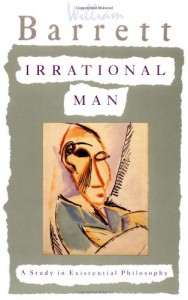Currently reading
How the World Works
The English Auden: Poems, Essays and Dramatic Writings, 1927-1939
Auden Generation: Literature and Politics in England in the 1930's
Collected Poems
Irrational Man: A Study in Existential Philosophy
 Published in 1958 this remains an excellent and lively read. In order to make the case for Existentialism, Barrett finds it necessary to establish the limitations and the false leads of alternatives, and he looks both to the rational and the religious for the roots of the problem to which Existentialism is a proposed solution. As a result, his book contributes to many debates that remain topical and significant.
Published in 1958 this remains an excellent and lively read. In order to make the case for Existentialism, Barrett finds it necessary to establish the limitations and the false leads of alternatives, and he looks both to the rational and the religious for the roots of the problem to which Existentialism is a proposed solution. As a result, his book contributes to many debates that remain topical and significant. In selecting quotes, however, I have arrived at a position described in a short story by Borges, in which a character aspires to write Don Quixote, in exactly the same words (no more and no less and with nothing different) as those used by Cervantes to write his novel of that name and with that content. I am prevented from doing this with Irrational Man by the maximum permitted word count for reviews. Yet, had I done that, I would not be writing the same book because I would be writing in a different context (2015 instead of 1958) and in the face of new problems, to which, all the same, I think my new book, identical in every punctuation mark to the original, would remain relevant and useful. Sadly, I do not suppose I am up to this challenge. Simply by selecting and typing out some quotes, I find myself entering into a debate that threatens to expand or refine or otherwise alter something that is (or maybe it is) already fine just as it is.
No believer, no matter how sincere, could possibly write the Divine Comedy today, even if he possessed a talent equal to Dante’s. Visions and symbols do not have the immediate and overwhelming reality for us that they had for the mediaeval poet. In the Divine Comedy the whole of nature is merely a canvas upon which the religious symbol and image are painted. Western man has spent more than five hundred years .. in stripping nature of these projections and turning it into a realm of neutral objects which his science may control. … A great work of art can never be repeated - the history of art shows us time and again that literal imitation leads to pastiche - because it springs from the human soul, which evolves like everything else in nature. This point must be insisted upon, contrary to the view of some of our more enthusiastic medievalists who picture the psychic containment of mediaeval man as a situation of human completeness to which we must return. History has never allowed man to return to the past in any total sense. And our psychological problems cannot be solved by a regression to a past state in which they had not yet been brought into being. (p.26)
August 1914 is the axial date in modern Western history and once past it, we are directly confronted with the present day world. The sense of power over the material universe with which modern man emerged .. from the Middle Ages changed on that date into its opposite: a sense of weakness and dereliction before the whirlwind that man is able to unleash but not control. (p.32)
No other people - not the Chinese, not the Hindus - produced theoretical science, and its discovery or invention by the Greeks has been what distinguished Western civilization from the other civilizations of the globe. In the same way, the uniqueness of Western religion is due to its Hebraic source, and the religious history of the West is the long story of the varying fortunes and mutations of the spirit of Hebraism. (p.72)
We have to see Plato’s rationalism, not as a cool scientific project such as a later century of the European Enlightenment might set for itself, but as a kind of passionately religious doctrine - a theory that promised man salvation from all the things he had feared from the earliest days, from death and time. The extraordinary emphasis Plato put upon reason is itself a religious impulse. (p.84)
For man to enter history as the rational animal, it was necessary for him to be convinced that the objects of his reasoning, the Ideas, were more real than his own intellectual person or the particular objects that made up the world. The great step forward into rationalism required its own mythology - such perhaps is always the ambiguity of human evolution. (p.85)
Heidegger ”Thinking only begins at the point where we have come to know that Reason, glorified for centuries, is the most obstinate adversary of thinking.” (p.206)







